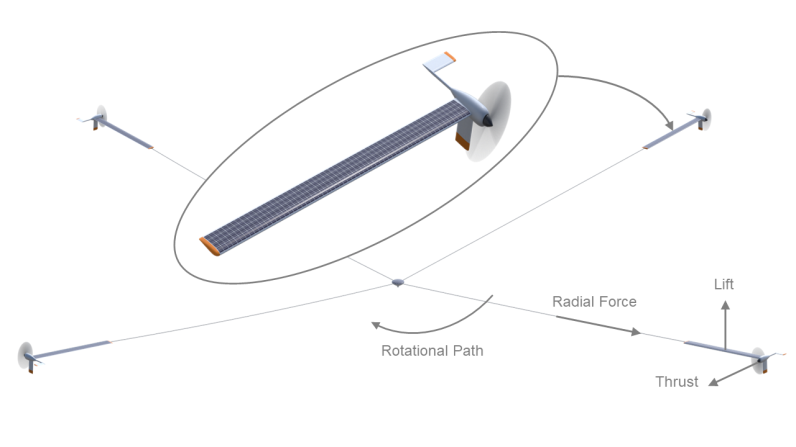Devorto, under the visionary leadership of founder Justin M Selfridge, Ph.D., is rewriting the narrative of aerospace innovation, pushing the boundaries of what's achievable in flight. Justin's brainchild, the Tethered Uni-Rotor Network (TURN), represents the culmination of years of expertise and a relentless pursuit of the aviation industry's last great milestone—persistent flight.
Justin's journey began at NASA Langley, where he spent seven years immersed in the world of adaptive controls and experimental aircraft. He explains, "Anytime NASA had a new type of prototype that they wanted to try flying, but they didn't know what the dynamics looked like, our group was to get it flying with the control laws, even though we didn't know how it was going to behave. So a lot of experimental aircraft crossed my plate."
During his time at NASA, he also worked on his own project, pursuing the Sikorsky Human-Powered Helicopter prize. This seemingly unattainable goal was to get a person off the ground, hover at 10 feet, and maintain it for a full minute without any motors, batteries, or engines. Departing from conventional strategies that favored expansive rotor wings, Justin's approach involved the use of slender wings to reduce induced drag. However, this innovative design encountered a setback as the slender wings introduced a flexibility issue, so this particular design proved unfeasible. Nonetheless, the venture highlighted the intricate nature of pursuing groundbreaking accomplishments in aviation, showcasing Justin's persistence and creative problem-solving in the face of ambitious challenges.
The pivotal moment came when Justin transitioned from exploring the intricacies of human-powered flight to envisioning a solar-powered aircraft. Recognizing the limitations of conventional fixed-wing aircraft designs and inspired by helicopters where radial acceleration places long, slender wings under tension, Justin conceived the idea of using system rotation as a design element for optimization. The Tethered Uni-Rotor Network (TURN) concept was born—a unique marriage of glider and helicopter architectures.
"The idea is, rather than having one aircraft that can't do the job on its own, what if we had four that are all tethered together in a hub-and-spoke arrangement like a helicopter and spinning like a helicopter, but for the sole purpose of pulling that wing taut? As soon as you put that wing under tension, it radically changes the design space," says Selfridge.

With this new design, Devorto is able to cut structural material for solar-powered aircraft in half while simultaneously doubling the amount of batteries onboard. By using thinner airfoils and maximizing the aspect ratio, TURN aims to reduce drag and enhance the overall aerodynamic efficiency of the aircraft.
Leveraging his background in adaptive controls, Selfridge, who possessed an electrical engineering degree, recognized the inherent control problem within unconventional aircraft design. Proposing this unique approach, he persuaded his faculty advisor that the complex dynamics of the system were fundamentally a control problem. Embracing the challenge, his dissertation aimed to unravel the mysteries of controlling a network of tethered aircraft without active controls on a central hub.
To validate the transformative potential of the TURN concept, Selfridge conducted a NASA-funded study on aerodynamic efficiency. The results showcased a remarkable 16-fold improvement, offering a glimpse into the system's capability to provide solar-powered persistent flight up to 60 degrees latitude year-round. This feasibility study set the stage for Devorto's journey toward commercialization.
Justin's decision to leave NASA for Devorto was strategic, driven by the commercialization opportunities presented by an Air Force Small Business Innovation Research (SBIR) grant. Recognizing that NASA's mission primarily focused on scientific research rather than commercialization, Justin embarked on a journey that showcased his commitment to realizing the potential of the TURN concept.
"I've loved my time working at NASA, but if I stayed, there's no way TURN would be commercialized. This amazing capability would just come to an end, and my Ph.D. dissertation would just remain a book study, and that's it. Because that's not NASA's mission," explained Selfridge.
As a solo founder, Justin successfully navigated entrepreneurship challenges by enlisting key advisors with diverse expertise. Ken Karklin, former COO of AeroVironment, brings experience in solar-powered aircraft and urban air mobility. Al Waddill, President of Groen Brothers Aviation, focuses on rotorcraft technology and spearheads strategic market entry. Rounding out the team is Mark November, who specializes in recruiting and funding for early-stage hard-tech ventures. Together, this advisory team forms a robust force, guiding Justin's journey from concept to market and contributing strategic insights to various facets of Devorto's development.
Devorto's journey, guided by Justin Selfridge's dedication and strategic decision-making, stands at the forefront of aerospace innovation. As Devorto continues to innovate, the future holds promises of persistence in flight and unparalleled capabilities that redefine the boundaries of aviation. To learn more, visit https://devorto.io/ or connect with Justin on LinkedIn.







Join the Conversation